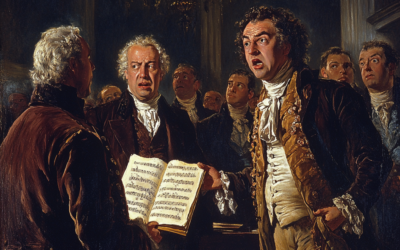The Unveiling of Symphony K.16
A Mozart Myth Dismantled
The Symphony No. 1 in E-flat major, K.16, attributed to young Wolfgang Mozart, reveals the complex truth behind his early compositions. Far from the prodigious work of an eight-year-old, it is instead a product of substantial parental intervention and musical simplification.
Mozart: The Fall of the Gods
This book offers a fresh and critical look at the life of Wolfgang Amadeus Mozart, challenging the myths that have surrounded him for centuries. We strip away the romanticised image of the “natural genius” and delve into the contradictions within Mozart’s extensive biographies. Backed by nearly 2,000 meticulously sourced citations, this work invites readers to explore a deeper, more complex understanding of Mozart. Perfect for those who wish to question the traditional narrative, this biography is a must-read for serious music lovers and historians.
“The original, more sophisticated musical passages were simplified by Leopold, possibly to align with the expectations of an infant prodigy.”
Mozart: The Fall of the Gods
Mozart’s Symphony No. 1 in E-flat major, K.16, long celebrated as a testament to his prodigious talent at just eight years old, reveals a much less straightforward reality. This symphony, attributed to the young Wolfgang Amadeus Mozart, is often paraded as evidence of his exceptional abilities. However, a closer examination suggests a more complex and less flattering picture.
The K.16 manuscript, bearing the title written by Mozart’s father Leopold, was intended to showcase Wolfgang’s early compositional prowess. Yet, historical accounts, including those from Mozart’s sister Nannerl, hint at significant doubts about the authenticity of this narrative. Nannerl’s memoirs recount a period in London when Wolfgang was supposedly barred from the piano due to Leopold’s illness, leading to the composition of this symphony. However, the evidence points to Leopold’s extensive involvement in both the composition and the final version of the piece.
The manuscript reveals several inconsistencies and peculiarities. For instance, while Nannerl claimed the symphony was intended to feature prominent parts for trumpets and timpani, these elements are notably absent in the K.16. Furthermore, the music’s complexity seems incongruous with the supposed abilities of an eight-year-old. The original, more sophisticated musical passages were simplified by Leopold, possibly to align with the expectations of an infant prodigy.
Leopold’s influence is evident in the extensive corrections and alterations found in the manuscript. Rather than a product of youthful genius, K.16 appears to be a heavily edited work, with Leopold’s modifications aimed at making the music more suitable for a young child’s capabilities. This includes removing intricate imitations and simplifying harmonies to ensure they fit the narrative of Wolfgang’s prodigiousness.
Moreover, Mozart’s ability to compose intricate music without a keyboard—suggested by Nannerl’s accounts—seems questionable. Adult Mozart himself struggled with composition when not in proximity to a keyboard, raising further doubts about the symphony’s origins.
The true nature of K.16 reflects a collaborative effort, with Leopold playing a significant role in shaping the symphony to fit his son’s alleged talent. The work is less a demonstration of an eight-year-old’s genius and more a product of parental intervention and musical simplification.
You May Also Like
When the Myth Collapsed
Vienna exposed the myth: La Finta semplice was riddled with errors, and Wolfgang’s supposed opera genius was nothing more than Leopold’s fabrication. With their reputation in ruins, father and son turned to Italy, hoping to rewrite history.
The London Notebook and the Vienna Disaster
Far from the myth of a flawless young genius, Mozart’s London Notebook reveals musical struggles and guided exercises, while the Vienna opera disaster proved that his father played a far greater role in his compositions than legend would have us believe.
Versailles, Vanity, and the Pursuit of Prestige
Leopold Mozart’s letters transformed his son’s European tour into a carefully staged fantasy—filled with exaggerated encounters, fabricated royal admiration, and a relentless pursuit of social prestige. But how much of it was real?
The Fabricated Childhood of Mozart
The legend of young Mozart’s divine genius crumbles under scrutiny, revealing a childhood dictated by Leopold’s ambition, carefully constructed myths, and a relentless pursuit of fame at the expense of genuine artistic education.
The Man Behind the Myth
Leopold Mozart’s legacy has been shaped by myths and hagiographies, but his letters reveal a man more concerned with financial gain and self-promotion than artistic integrity. Was he truly a devoted father, or simply an opportunist?
Constanze vs. The Catholic Church
For over two centuries, scholars have debated the circumstances surrounding Mozart’s burial. Constanze Mozart’s supposed inability to mark his grave, the confrontation with the Catholic Church over funeral masses, and the baffling disappearance of Mozart’s body all contribute to a mystery stranger than fiction. Did a powerful group keep her silent? And what really happened to Mozart’s remains?







